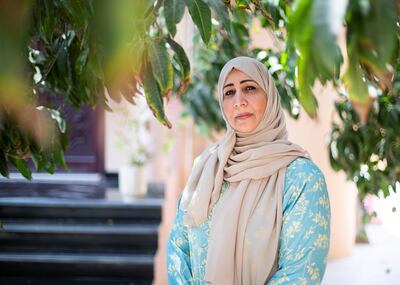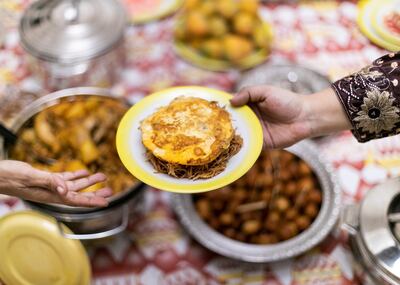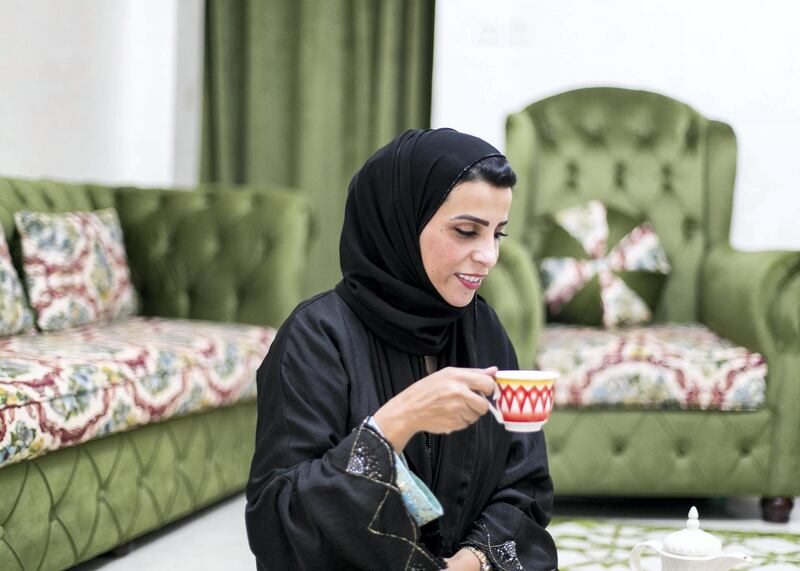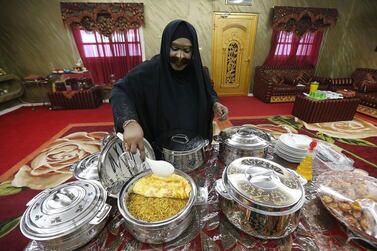Enterprising Emirati women who set up their own food businesses from home have been left to count the cost of the Covid-19 pandemic after suffering a slump in sales.
The group of traders, who used their flair in the kitchen to bolster their income, relied on exhibitions and fairs to sell their home-crafted culinary creations before the onset of the outbreak brought such public events to a temporary halt.
Welfare associations across the country have been trying to support low-income families through online courses on how to promote their products and through facilitating licensing discounts or exemptions.
These efforts aim to lift the affected businesses and give them fresh impetus.
Ayesha Al Qaydi, a divorced Emirati mother-of-seven, said that she had used exhibitions and food fairs to sell her homemade Emirati traditional dishes before the pandemic.
“I started my business in 2017 and participated in many events across the country and abroad such as Oman,” said Ms Al Qaydi, 43, from Kalba in Sharjah.
“People get to know me and try my home-made food at food fairs and exhibitions but now, with the coronavirus outbreak, all events have been cancelled until further notice."
Ms Al Qaydi started her food business to help cover her expenses after all of her children got married and left the family home.

“I am unemployed and I live on the government monthly social support so I had to find another source of income to cover my expenses,” she said.
Ms Al Qaydi used to prepare three to four large cooking pots daily and sell them to customers.
She said that the some of the most in-demand dishes were harees – made from boiled, cracked, or coarsely-ground wheat mixed with meat or chicken and slow-cooked, Aaysh – spiced rice with chicken or meat, khabees – a sweet dish made of brown flour, rose water, sugar, saffron and Luqaimat - a deep-fried dough soaked in date syrup.
“Now I don’t cook much and only when neighbours or family members ask for specific dishes,” she said.
“Many people stopped ordering food since March, after the spread of the virus, and that has affected my income and all that I can do now is wait until the virus is gone.”
Another unemployed Emirati mother-of-four, who also runs a food business from home, said that the pandemic affected her sales.
“The food packaging costs have doubled since the virus outbreak - the small box used to be sold at Dh3.5 and now it is Dh6.5,” said Maryam Al Shamsi, 45-year-old Emirati widower from Fujairah.
Ms Al Shamsi started selling sweets and cakes in 2012 after attending many cake baking and sweets preparing courses.
“Cake baking is one of my favourite hobbies which I decided to turn into a small business,” she said.
“My sales mainly rely on public events and people celebrating special occasions so I can say that the past four months were not the best.
“I still receive orders but not in the same quantities as before due to social distancing and gatherings restrictions.”
Maryam Al Kaabi, from Al Ain, said that her husband's retirement pension does not cover the family expenses so she had to open a home business.
“I started selling Arabic spices three years ago to support my family,” said Ms Al Kaabi, a 40-year-old mother of six.
“I usually sell the spices and gain new customers through food fairs and low-income families’ exhibitions but now my business has stopped and that has affected our income.”

Ms Al Kaabi said that she used to make between Dh2,500 to Dh3,500 at each event but now her family has only her husband's pension to fall back on.
“I am pregnant and my children still study at school and one is in the university so I need to keep running my business to support the family but this will not happen now,” she said.
But welfare associations across the country are ready to step in to support those most affected.
“We organise online training courses for home business owners on how to manage their business and promote it online during the current situation,” said Shaikha Al Sabousi, events organiser at Dubai Women’s Association's Al Lisaili branch.
“We are always available to provide advice to them on anything related to their business.”
Fatima Salem, head of the productive families section at Fujairah welfare association, said that the association provides licensing discounts or exemptions to low-income families depending on their situation.
“Besides the licensing facilitation we also provide some unemployed mothers with fabric to stitch them into clothes and we sell them to other institutions,” said Ms Salem.







